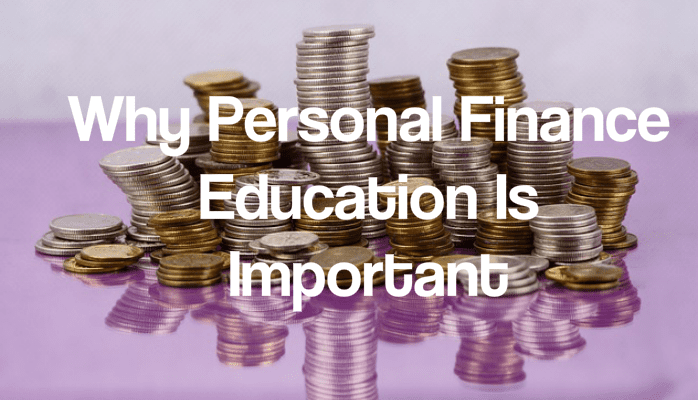When the question of who needs personal financial education comes up, the people that come to mind are those who probably deal who business or those seeking to invest. Most people would not be bothered with any financial education, and they are always under the false illusion that they are in touch with their finances. Others don’t see how relevant it is to their daily lives. But the fact remains that financial education goes beyond the aspects of business and investments.
It is not always about statements of financial position and statement of profits and loss and other comprehensive income; there is a whole different perspective on financial knowledge. Financial literacy is an important aspect of life by the fact that all people use money. It is essential especially in the early years of one’s life as it molds and influences minds to manage finances effectively. With that in mind, this article will consider why personal finance education is important to everyone.
1) It Builds Financial Literacy
Financial education builds financial literacy
(Source: https://pixabay.com/en/money-finance-business-financial-2696228/)
Financial literacy can be regarded as that knowledge that enables one to make responsible decisions involving money. It can help one to manage their debt, account for expenditures and incomes and also utilize various services that revolve around money. Such services may include bank accounts, use of credit and debit cards. When one undertakes financial education and indulges on research topics revolving around it, the culmination of this education is financial literacy.
-
-
It Helps Build Knowledge of Financial Products
-
Financial education enables you to know various financial products
(Source: https://www.pexels.com/photo/bank-blur-business-buy-259200/)
The rationale for financial education in the contemporary world is due to the increasing complexity of the financial market. Many people are seeking financial products without express knowledge of how they work. For example, retirees are taking on pension schemes which they are ignorant about. Business people are borrowing from lending institutions without any knowledge of debt management.
Consumers have been left without guidance on financial products
When comparing with the past, professionals always guided consumers of financial products on the best course of action. They also helped them plan. However, most consumers are at present making all these decisions by themselves. This leaves them susceptible to risks that revolve around these financial decisions. It is no wonder that people are heavily in debt nowadays. It is the same reason as to why businesses are becoming increasingly insolvent.
-
-
The Plight of the Young Population
-
The young need financial education more than ever
(Source: https://pixabay.com/en/girl-woman-joy-of-life-jump-free-2940655/)
With regard to the young population, it is equally important to impart financial knowledge to them. For starters, they are in their formative years. This means that they are not exposed to many things in life and in this context, the ideals of finance and economics. Thus, you might find that they engage in activities such as borrowing and spending with no knowledge of what each entails.
The young population is also more inclined to spend impulsively. Since they have no responsibilities, they are tempted to spend on every impulse they get with no due regard to delayed gratification.
Young people have more debt options
Surveys have also shown that young people, especially students have more debt options. Banks and other financial institutions have embarked on campaigns to attract students to things such as credit cards. The students end up paying their tuition and spending on things they need in school such as textbooks. Students also have more debt considering that they are given student college loans. Some ending up lagging with huge debt after they graduate due to poor financial management skills.
Thus, financial education ought to be imparted when considering the plight of the young people in society.
-
-
Ideological Differences of Financial Advisors
-
Different financial advisors have different opinions
(Source: https://pixabay.com/en/face-faces-dialogue-talk-psyche-1370955/)
There is an increasing number of financial advisors in the market who apply various ideals and philosophies in their work. They might be offering financially sound advice but different persons have different circumstances and objectives. Some financial matters are even controversial amongst financial advisors across the board. They rarely agree on a specific course of action for a specific problem.
Every financial advisor adheres to some philosophy
For example, let’s consider investments, you might find that one financial advisor leans towards taking high risk for greater returns while another tends to lean towards taking less risk for lower but guaranteed returns. When considering the advice that’s coming from both financial advisors, they are all valid and sound. However, they are diametrically opposed.
An investor may be torn between the two. A proper course of action may not be quickly taken by the investor because he/she will be confused by the two conflicting pieces of financial advice. It even gets worse when the individual lacks financial education. He/she will not be able to assess in a financial sense what is being presented as advice.
The individual will also not be able to understand the basic underpinnings of the ideals being fronted for purposes of making a decision. In another sense, the individual will also be unable to understand their own financial position and circumstances. In essence, financial education is important since it will enable such individuals to determine what works for them even when given financial advice from different ideological points.
-
-
It Promotes Saving and Financial Independence
-
Financial education promotes a savings culture
(Source: https://www.pexels.com/photo/money-pink-coins-pig-9660/)
Financial education enables individuals to see the importance of saving and also to practice it. It also inculcates a culture that can lead to financial independence. When people know the importance of saving, they are inclined to save even more. This gives them a better edge when it comes to having a financial buffer in their lives. It also exposes them to different forms of investment which lead to financial independence and stability in the long run.
Conclusion
Personal finance education is an important aspect that enables people to demonstrate personal responsibility for their finances. The benefits of having such an education are immense and it is one of the best forms of education that you can acquire in your lifetime.

































